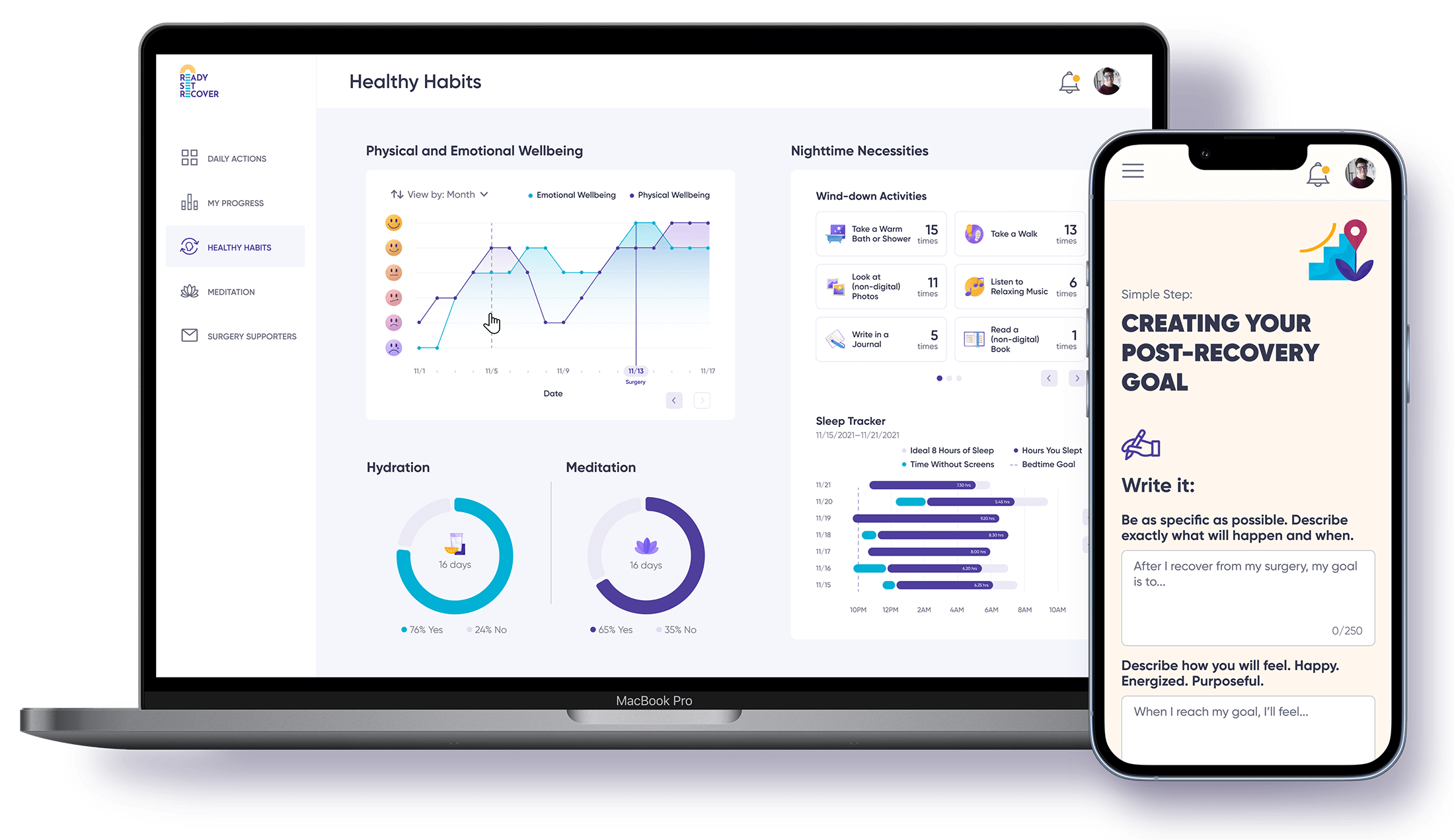How to Ease Anxiety Before Surgery and Stay Calm


What Is Anxiety Before Surgery?
Anxiety before surgery is the nervousness, fear, or worry people feel before a medical procedure. It can show up in many ways—racing thoughts, trouble sleeping, nausea, or even panic attacks. Some fear the unknown, while others worry about pain, recovery, or complications.
If you're struggling with anxiety about surgery, there are additional calming strategies worth exploring before your procedure. This kind of anxiety is normal. Facing surgery means putting your health in someone else’s hands, which can feel unsettling. But understanding why it happens and learning how to manage it can make a big difference in your experience.
Identifying the Signs of Pre-Surgery Anxiety

The first step in dealing with anxiety before surgery is recognizing the signs and understanding the difference between what is considered moderate (or typical) anxiety and what is severe, and potentially harmful.
Moderate Anxiety
People who are experiencing moderate levels of anxiety about their upcoming procedure, have most likely dealt with similar experiences during other aspects of their lives that were fairly stressful. Some common anxiety symptoms include a racing heart, a nervous stomach, loss of appetite, restless sleep, inability to focus, muscle tension and non-clinical depression. If you're familiar with these patterns, it's important to continuously assess these feelings and look for ways to alleviate them, for which we'll go into further detail.
Severe Anxiety
If you're experiencing physical issues such as an irregular heartbeat, high blood pressure, prolonged insomnia, panic attacks, hyperventilation, nausea, vomiting, headaches, light-headedness, fainting or severe depression then it could be a more serious situation and it's highly advisable to seek professional support as soon as possible.
Working with Health Care Professionals

Your medical team, including doctors, nurses, social workers, and other medical professionals, is there to help you throughout your surgery journey. They can provide reassurance and guidance on how to reduce anxiety before your upcoming procedure.
Some patients may benefit from speaking with a mental health professional, such as a psychologist or psychiatrist, who can offer additional support and techniques for managing anxiety. You might also find solace in joining support groups where you can share your experiences and learn from others who have undergone similar surgeries.
Relaxation Techniques to Calm Anxiety

There are several relaxation techniques that can help calm anxiety before surgery. Breathing exercises, such as deep breathing and progressive muscle relaxation, can help reduce stress and promote a sense of calm. Mindfulness meditation can also be beneficial for those who experience anxiety in their daily life, as it helps cultivate a non-judgmental awareness of thoughts and feelings. Ready Set Recover has a variety of meditations to choose from that can help stay calm prior to an upcoming surgery.
Another effective way to relieve anxiety is through guided imagery. This technique involves visualizing a calming scene or situation to help promote relaxation. Choose an image that is soothing and appeals to your personal taste, such as a tranquil beach or a peaceful forest. Close your eyes, focus on your scene and breathe deeply from your diaphragm. It's natural for your mind to wander so if it does, try not to get frustrated. Just recognize it's happening and redirect your thoughts back to your happy place.
Alternative Therapies and Supplements
Some patients may find relief from pre-surgery anxiety through alternative therapies like acupuncture, massage, or aromatherapy.
Massage Therapy
Massage therapy can be an effective way to alleviate anxiety before surgery. Massages help to relax tense muscles, reduce physical pain, and promote a sense of calm and well-being. As the body relaxes, the release of feel-good hormones like endorphins, serotonin, and dopamine can further reduce anxiety. By easing both physical and mental tension, massage therapy can help patients feel more prepared and less anxious about their upcoming surgery.
Acupuncture
Acupuncture, a traditional Chinese medicine practice, involves the insertion of thin needles into specific points on the body to balance the flow of energy, or "qi." Research has shown that acupuncture can help reduce anxiety by stimulating the release of endorphins and other neurotransmitters that promote relaxation. Additionally, acupuncture can help improve sleep quality, which is often disrupted by anxiety. Better sleep can lead to reduced anxiety and a more balanced emotional state before surgery.
Aromatherapy
Aromatherapy, the use of essential oils for therapeutic purposes, can also be beneficial in reducing anxiety before surgery. Inhaling the scent of essential oils can trigger the olfactory system, which is closely connected to the limbic system, a region of the brain responsible for emotions and memory. Certain essential oils, such as lavender, chamomile, or bergamot, have been shown to have calming effects on the nervous system and can help alleviate feelings of anxiety and stress. Aromatherapy can be used in various ways, such as through diffusers, inhalers, or massage oils, providing a natural and non-invasive approach to managing pre-surgery anxiety.
Supplements
Certain herbal supplements, such as CBD, valerian root, passionflower, or kava, may also help reduce anxiety. However, it's crucial to consult your doctor before using any supplements, as they may interact with medications or affect your surgical procedure.
Preparing for Surgery and Reducing Anxiety
Being well-prepared for your surgery can alleviate some of the anxiety associated with the unknown. Take the time to learn about your surgical procedure and ask your medical team any questions you may have. Understanding what to expect can help reduce anxiety and promote a more positive experience.
Additionally, ensure you follow your doctor's preoperative instructions, such as avoiding certain medications, fasting, or stopping smoking. Nicotine replacement therapy can be beneficial for patients who smoke cigarettes and need to quit before surgery, as it may help alleviate withdrawal symptoms and reduce anxiety.
Creating a Positive Environment for Healing
It's essential to create a comfortable and supportive environment for your recovery after surgery. Surround yourself with loved ones who can provide emotional support, or consider joining a support group to connect with others who have undergone similar procedures.
Ensure you have a comfortable space to rest and heal, and plan to have healthy snacks and meals on hand for your recovery period. Staying well-nourished and hydrated can have a significant impact on the wound healing process and your overall sense of well-being.
Embracing the Power of Distraction

Sometimes, the best way to reduce anxiety is to shift your focus away from the impending surgery. Engage in activities that bring you joy and relaxation, such as reading, watching movies, listening to music, or spending time with friends and family. By doing things you enjoy, you can help take your mind off the upcoming procedure and alleviate stress.
Remembering the Benefits of Surgery
It's crucial to remind yourself of the reasons behind your surgery and the positive outcomes it may bring. Whether it's to improve your quality of life, alleviate pain, or address a medical condition, focusing on the potential benefits can help you feel more confident and less anxious about the procedure. Yes, in the short-term, things may be more difficult than usual, but hopefully, the long-term benefits are a net positive -- or simply put, two (or three, or four) steps forward, one step back.
From Panic to Peace: Managing Anxiety Before Surgery
Experiencing anxiety before surgery is a common and natural response. However, by using the strategies and techniques outlined in this article, you can effectively manage and reduce your pre-surgery anxiety. It's been said numerous times throughout this article, so to reiterate, remember that it's extremely important to communicate with your healthcare team, as they can provide valuable guidance and support throughout your surgical journey. Ultimately, staying informed, prepared, and proactive can help ensure a more positive and less anxiety-ridden experience.
And a Shameless Plug...
Blog posts can provide lots of useful information, and ideally this one is no exception. However, it's one thing to read a blog post, and another to actually take the necessary steps to put everything into practice, so if you'd like further assistance getting over your fear of surgery, Ready Set Recover is here to help. The program provides a step-by-step framework of Daily Actions enabling you prepare for and recover from surgery, so you can get better, faster and with less stress and fear. It's time to prioritize your health. We hope you'll join us!
Frequently Asked Questions
How to manage anxiety before surgery?
Try deep breathing, meditation, or listening to calming music. Talking to your doctor about your concerns can help, and some people find it helpful to stay busy or distracted before the procedure.
Can surgery cause anxiety attacks?
Yes, the stress of surgery can trigger anxiety attacks, especially in people prone to anxiety. The fear of the unknown, anesthesia, or complications can contribute to this.
Can I ask for anxiety medication before surgery?
Absolutely. Many doctors prescribe mild sedatives or anti-anxiety medication to help patients feel calmer before surgery. Just let your healthcare provider know how you're feeling.
Can people with anxiety go under anesthesia?
Yes. Anesthesia is generally safe for people with anxiety. In fact, anesthesiologists can adjust medications to help keep you calm before and during the procedure.
Is there a surgery to stop anxiety?
Not exactly. Some procedures, like deep brain stimulation or vagus nerve stimulation, have been explored for severe anxiety, but they’re not common treatments. Therapy and medication are usually the best options.






